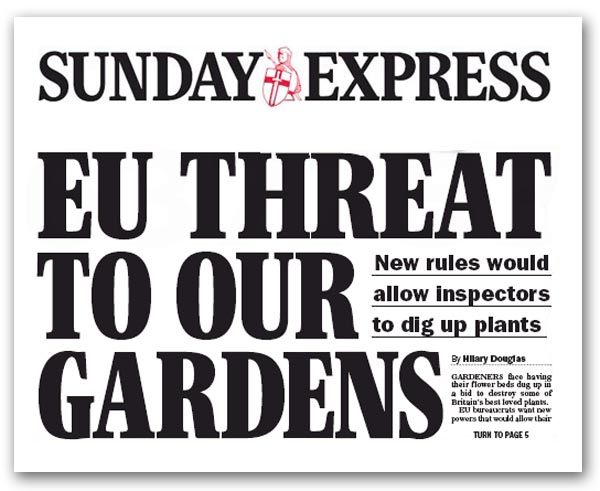10/03/2014
Two episodes recently have highlighted the malign role of the European Union, the flooding of the Somerset Levels, and the meddling in the Ukraine. In neither instance, however, has the legacy media been able to handle the EU involvement, or explain its importance.
Yet, in the
Sunday Express yesterday, we get a trivial little story, complete with
an editorial, headed "Garden meddling EU must finally be cut down to size".
And that is the measure of our media. When the great debate erupted over corporate tax avoidance, the media
was silent on the role of the EU and the "free movement of capital and payments" provisions of the treaties. Over the horsemeat scandal, it was similarly silent about the failure of EU regulation, which created the conditions for the wholesale fraud. Likewise, we saw next to no criticism of the EU in the
silicone breast implants scandal, despite the egregious failure of the CE system.
The only way, it seems, that the media can deal with the EU is in terms that it can understand, To do so, it reduces the complexity of the EU into something it can cope with, turning it into a "red-tape" machine, and then spends its time chasing after "bent banana" stories and the like.
This type of story the hacks can deal with at a comic-book level, keeping them within their comfort zone. But, when it comes to looking at the EU as a serious force, engaged in serious policy issues, the hacks simply cannot cope. This does not fit their narrative. The EU is allowed to be a "threat" to our gardens, but not to world peace.
Interestingly, the issue at hand we dealt with in
September last when the
Daily Mail made a hash of the story. Far from being and "EU red tape" story, these rules actually originate with the OECD. We saw the same dynamic with the jam story. When the media pins the blame on the EU, any other agency is invisible.
The system of global governance, of course, is so way beyond the comprehension of the average hack that they are not even close to being able to report the details. It is simply beyond their capability. Whole areas of policy are closed off, beyond the scope of media reportage.
And this is where, increasingly, we are going to have to fall back on our own resources. The legacy media is no longer part of the game. More part of the entertainment industry, its sates itself on a diet of trivia and superficiality. If we want detail and intelligent reporting, we will have to provide it ourselves.
Fortunately for the media, enough people are sufficiently happy with what they get. Their businesses are mostly safe. But we should no longer confuse them with news providers or analysts. We are on our own.

